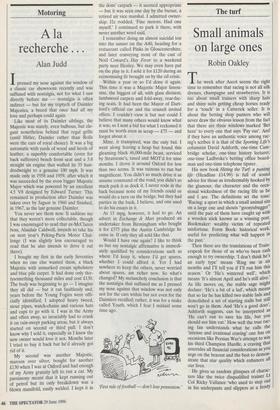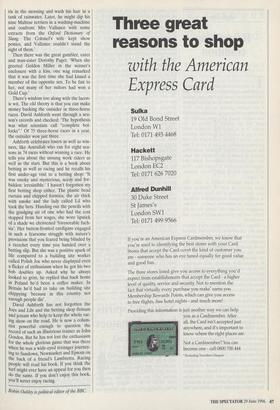The turf
Small animals on large ones
Robin Oakley
His new book Hitting the Turf: a punting life (Headline £14.99) is full of sound advice for those as irredeemably hooked by the glamour, the character and the occa- sional wickedness of the racing life as he and I are. The definitions set the tone: `Racing: a sport in which a small animal sits on a large one and shouts "goonyubugger' until the pair of them have caught up with a wooden stick known as a winning post. Bookmaker: wealthy victim of repeated misfortune. Form Book: historical work, useful for predicting what will happen in the past.'
Then there are the translations of Train- erspeak for those of us who've been rash enough to try ownership. 'I don't think he's an early type' means 'Ring me in six months and I'll tell you if I'll run him this season.' Or 'He's wintered well', which, means 'It's almost April and he's still alive.' As life moves on, the stable sage might declare: 'He's a bit of a lad', which means that so far he has killed two stable lads and demolished a set of starting stalls but still won't go in them. And 'He's a good doer', Ashforth suggests, can be interpreted as `He can't run to save his life, but you should see him eat.' How well the true rac- ing fan understands what he calls the `intense and irrational craving' one has on occasions like Persian War's attempt to win his third Champion Hurdle, a craving that overrides all financial considerations as you urge on the bravest and the best to demon- strate that star quality which enhances all our lives.
He gives us random glimpses of charac- ters like the twice disqualified trainer Lt Col Ricky Valiance 'who used to step out in his underpants and slippers at a frosty six in the morning and wash his hair in a tank of rainwater. Later, he might dip his nine Maltese terriers in a washing-machine and confront Mrs Vallance with some extracts from the Oxford Dictionary of Slang. The Colonel's wife kept show ponies, and Vallance couldn't stand the sight of them.'
Then there was the great gambler, eater and man-eater Dorothy Paget. 'When she greeted Golden Miller in the winner's enclosure with a kiss, one wag remarked that it was the first time she had kissed a member of the opposite sex. To be fair to her, not many of her suitors had won a Gold Cup.'
There's wisdom too along with the lacon- ic wit. The old theory is that you can make money backing the outsider in three-horse races. David Ashforth went through a sea- son's records and checked: 'The hypothesis was what scientists call "complete bol- locks".' Of 75 three-horse races in a year, the outsider won just three.
Ashforth celebrates losers as well as win- ners, like Amrullah who ran for eight sea- sons in 74 races without winning a race. He tells you about the unsung work riders as well as the stars. But this is a book about betting as well as racing and he recalls his first under-age visit to a betting shop: 'It was smoky and mysterious, seedy and for- bidden: irresistible.' I haven't forgotten my first betting shop either. The plastic bead curtain and chit:Tied formica, the air thick with smoke and the lady called Lil who took the bets. Handing out the pencils with the grudging air of one who had the cost stopped from her wages, she wore lipstick of a shade we christened 'foreseeable fuch- sia'. Her button-fronted cardigans engaged in such a fearsome struggle with nature's provisions that you feared being blinded by a ricochet every time you handed over a betting slip. But she was a positive spark of life compared to a building site worker called Polish Joe who never displayed even a flicker of enthusiasm when he got his two bob doubles up. Asked why he always looked so grim, he replied that back home In Poland he'd been a coffee maker. In Britain he'd had to take on building site chippying 'because in this country not enough people die'.
David Ashforth has not forgotten the Joes and Lils and the betting shop flotsam and jetsam who help to keep the whole rac- ing show on the road. He is now a colum- nist powerful enough to question the record of such an illustrious trainer as John Gosden. But he has not lost the enthusiasm for the whole glorious game that was there when he was a wide-eyed teenager journey- ing to Sandown, Newmarket and Epsom on the back of a friend's Lambretta. Racing people will read his book. If you think the turf might ever have an appeal for you then do the same. If you don't enjoy this book, you'll never enjoy racing.



























































 Previous page
Previous page